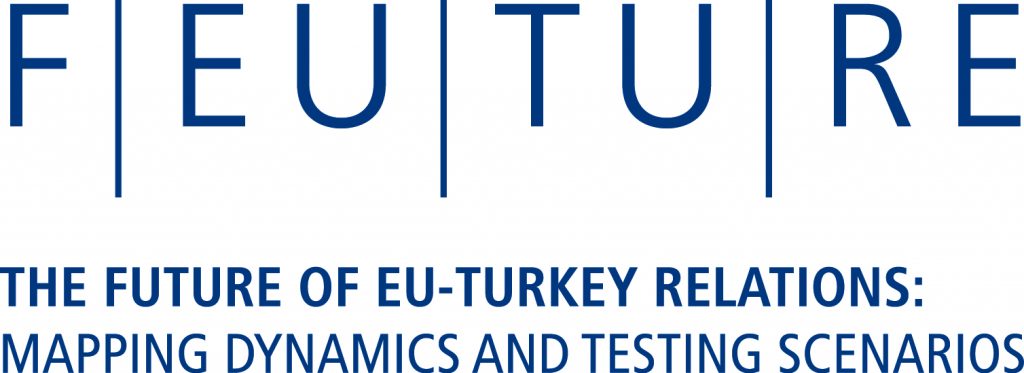Project Description
| Full Title: | The Future of EU-Turkey Relations: Mapping Dynamics and Testing Scenarios |
| Project in Brief: | FEUTURE is an EU funded (under Horizon 2020) multi-disciplinary research project, carried out by a consortium of 15 highly experienced partner institutes from the EU (CETEUS, CIDOB, CIFE, DIIS, Eliamep, IAI, TEPSA), Turkey (EDAM, Bilgi, Koc, METU, Sabanci) and Iraq (MERI), Georgia (CRRC) and Egypt (AUC). The aim is to assess and analyse future prospects of EU-Turkey relations, and in consideration of the neighbourhood that is unravelling to the east and south and a power shift that can be detected at global level
Website: FEUTURE.eu |
| Term: | 2016-2019 |
| Most Recent: | Publications and Events |

Facebook: www.facebook.com/feuture.eu Twitter: @FEUTURE_EU
Context
More than 1.3 million asylum applications were registered in the EU in 2015. Although this came as no surprise to the EU and its Member States, this massive refugee influx put the Schengen area severely under strain. At the same time Euro-scepticism and populism are on the rise in EU Member States and while a GREXIT (Greece leaving Europe) was, for the time being, avoided last-minute, the risk of BREXIT (Britain leaving Europe) looms.
Turkey, on its side, has to accommodate more than three million refugees on its territory. The Turkish economy is substantially slowing down and Turkey’s relations with Russia have seen an unprecedented negative turn since the Turkish downing of a Russian jet in November 2015. Finally, the authoritarian drift in Turkey’s political system continues unabated and Prime Minister of Turkey, Ahmet Davutoğlu, (was encouraged to) resign in May 2016, leaving President Erdoğan as the sole uncontested leader of the country.
These rather gloomy snapshots of the EU and Turkey in recent months highlight mounting challenges for both internally, in relation to one another, and internationally. The inherent paradox is that these challenges resulted in the restart of Turkey’s accession negotiations and the visa liberalization procedure with the EU and a strengthening of institutional EU-Turkey relations through biannual EU-Turkey Summits and regular meetings at the highest levels at times when Turkey’s reform process in light of the Copenhagen Criteria has seriously back slided. The EU has re-discovered Turkey as a “key strategic partner” and the EU-Turkey Refugee Deal will represent one of the key pillars of this strategic partnership in the months to come.
Against this backdrop, it seems more relevant than ever to assess and analyse future prospects of EU-Turkey relations also in consideration of the neighbourhood that is unravelling to the east and south and a power shift that can be detected at global level. Therefore, we are delighted to announce the launch of the three year research project “FEUTURE”, The Future of EU-Turkey Relations: Mapping Dynamics and Testing Scenarios, funded by the European Commission’s Horizon 2020 Programme.
FEUTURE started on 1 April 2016 and will end its research activities on 31 March 2019. Our coordinating institutes, Jean Monnet Chair/CETEUS at the University of Cologne as project coordinator and Istituto Affari Internazionali, Rome as scientific coordinator, have long track records in research on the EU and on Turkey as well as in coordinating EU funded multi-disciplinary research projects. They are joined by other 13 equally experienced partner institutes from the EU (CIDOB, CIFE, DIIS, Eliamep, IAI, TEPSA), Turkey (EDAM, Bilgi, Koc, METU, Sabanci) and Iraq (MERI), Georgia (CRRC) and Egypt (AUC). This strong consortium is well equipped to implement in-depth re-search on such a highly topical issue and very well connected to the stakeholder community in order to issue policy recommendations.
MERI’s Participation
The Middle East Research Institute (MERI), together with other participant universities and think tanks, is working to identify key security (EDAM, IAI, MERI) and energy/climate drivers (ELIAMEP, IAI, MERI) in the Middle East that are likely to lead EU-Turkish relations to conflict, cooperation or convergence. Specifically, in terms of security, MERI is focusing on the future of Iraq, including the issue of Kurdish independence; the Kurdish question; the Syrian civil war (radicalisation, foreign fighters and terrorism); Iran (its nuclear programme, missile proliferation and its rising influence in the region); and regional security dynamics in a post-Arab Spring context. In terms of energy, MERI is mainly focusing on the evolution of the Southern Gas Corridor as the cornerstone of EU-Turkey energy cooperation, and the approach of Turkey towards the initiative; political, security and economic development in Iraq and Iraqi Kurdistan in relation to their role as key oil producers and exporters to the EU and Turkey; and the return of Iran and its potential contribution to EU and Turkey energy strategies.
We are looking forward to inspiring three years of research on EU-Turkey relations and to sharing our research findings with you in the f(e)uture.

This project has received funding from the European Union’s Horizon 2020 Research and Innovation Programme under Grant Agreement No 692976.
For more information please contact us at info[AT]meri-k.org

